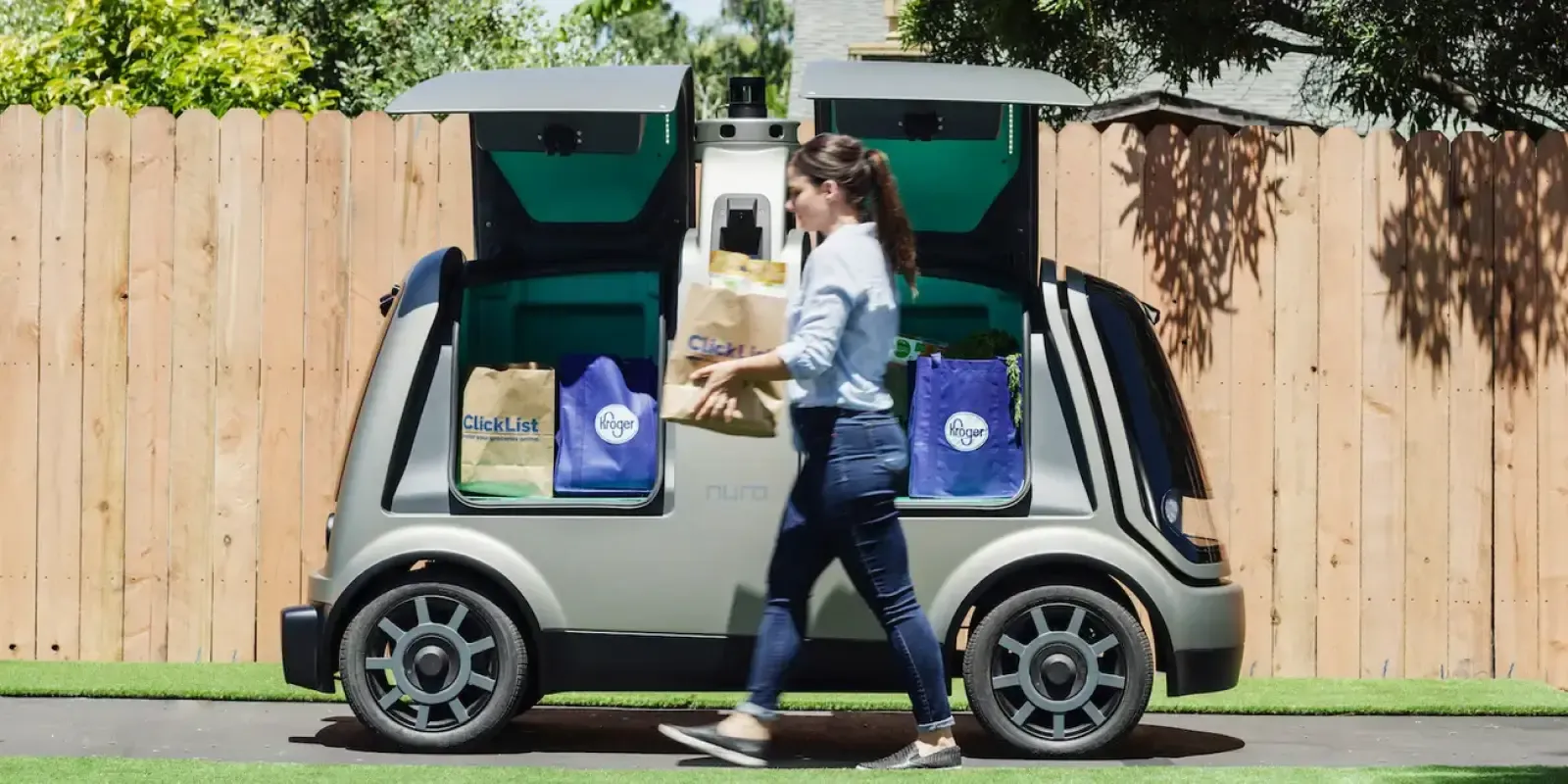Services
SERVICES
SOLUTIONS
TECHNOLOGIES
Industries
Insights
TRENDING TOPICS
INDUSTRY-RELATED TOPICS
OUR EXPERTS

March 20, 2025
From marketing and customer care to logistics and security, ML in ecommerce is paving the way for innovations in various business functions. Let's find out how machine learning algorithms are applied in this field and what advantages ecommerce companies can get from implementing ML in their operations.
ML-based recommendation systems are a staple in all major ecommerce platforms and online stores as they drive upselling. These engines can follow two distinct approaches to provide suggestions. Those relying on content-based filtering check a customer's purchase history and recommend other products with characteristics similar to those already bought. Systems using collaborative filtering, on the other hand, will suggest products that have already been ordered and positively rated by other users with similar buying patterns.
Increased average order value, greater customer lifetime value
Similarly to recommendation systems, this technique embraces customization to drive sales. ML solutions can segment potential new customers and target them with tailored ads according to a variety of parameters, like their social media interactions, previous online purchases (including those made in virtual stores), Google search history, and other types of big data. Then, machine learning algorithms process this information to frame customer behavior and purchase patterns, forecasting the products they may like.
Enhanced lead conversion, optimized marketing costs and ROI
Traditional search engines integrated into ecommerce stores match the keywords used for the site search and those chosen to describe the products in stock. However, when enhanced with deep learning-based natural language processing capabilities, these tools can achieve way deeper context understanding. For example, an ML-driven engine can take into account users’ interests, purchase habits, and past interactions to better interpret their intent and provide more relevant search results.
Easier content or product research for a smoother user experience
Scheme title: Machine learning-driven smart search engine
More and more ecommerce platforms and online stores leverage machine learning to optimize their pricing strategies and personalize discounts or other promotions. This technique, usually referred to as dynamic pricing, involves periodic and customized price adjustments (even every few minutes, in the case of Amazon) based on customer data, pricing history of similar products, sales trends, competitors' offers, demand compared to supply, price elasticity of demand, and more.
Maximized revenues and minimized customer churn
Scheme title: Static vs dynamic pricing
Compared to rule-based bots which can only solve simple queries, chatbots and virtual shopping assistants powered by natural language processing and generative AI also understand the context in which they operate and, above all, learn from experience, i.e. from previous customer interactions. This enables conversational AI solutions to maintain realistic communication with clients and assist or replace humans in a variety of marketing, sales, or customer support tasks. For example, they can generate product catalogs, clarify available shipping options, ask questions to understand customer preferences, offer coupons depending on their responses, place orders, and create warranty repairs requests.
Greater interactivity and non-stop support, superior customer satisfaction, improved customer retention
Scheme title: How chatbots operate
Contextual shopping solutions focus on routing customers towards the products they need while providing them with a more interactive experience.Powered by machine learning and computer vision technologies, these applications identify and highlight specific products or brands that appear in online videos. Sellers can embed links to the related product page, enabling users to purchase such items without leaving multimedia content.
Increased customer engagement, better lead conversion

Image title: A fashion show video with an overlay linking to mentioned products
Ecommerce applications equipped with computer vision-enabled visual search allow users to take a photo of a product they are interested in, upload it to a search engine, and find visually similar items available for sale based on shared features. These systems can even recommend matching items, such as clothes that go well with the one in the photo to create a better outfit. Popularized by Google Lens, this technology has been incorporated into various ecommerce platforms, online stores, and apps, such as Amazon and H&M.

Image title: Google Lens application for product search
More convenient shopping experience and increased sales
ML powers ecommerce predictive analytics solutions, helping retailers forecast upcoming sales trends to plan out restocking to match supply and demand. This also comes in handy for optimizing the catalog, therefore reducing storage utilization and the risk of food spoilage. The variables considered include economic conditions, seasonality-driven purchase patterns, social media sentiment, product reviews, and ratings. All these data points come from various sources, such as social media, ecommerce websites, or POS solutions.
Optimized inventory management and minimized waste
Scheme title: Data sources for inventory optimization
Data source: deloitte.com — The age of with Leveraging AI to connect the retail enterprise of the future
Machine learning in retail and ecommerce facilitates product distribution via delivery optimization solutions that process data from prior orders and suggest the best expedition methods and conditions (such as free or one-day delivery) based on customer needs. As for actual shipping, the process can be accelerated through machine learning-based route planning. These solutions analyze real-time traffic data, weather conditions, and drivers' experience and performance to recommend the fastest route.
Improved logistics, including faster deliveries

Image title: Onfleet’ route optimization solution
Data source: onfleet.com — Power your retail & eCommerce deliveries
Despite still being in the realm of experimentation rather than at a full implementation stage, self-driving vehicles powered by deep learning ML algorithms can streamline product delivery in the years to come. Several pioneering companies like Amazon and Kroger are investing in these technologies with rather promising results, especially when it comes to speeding up last-mile deliveries and minimizing their costs.
Faster and cheaper product delivery

Image title: Kroger’s self-driving vehicle for grocery delivery
Data source: businessinsider.com — Kroger has launched self-driving grocery deliveries in Arizona
Many companies have already implemented ML solutions to protect their ecommerce portals and websites from a wide range of criminal activities, including identity theft and fraudulent electronic payments. ML algorithms can spot recurring patterns among the data they process, but also notice if something "breaks the rules". Indeed, ML in fraud detection is commonly deployed to detect anomalies among the credit card accounts under scrutiny (such as an increasing frequency of transactions) that may be signs of fraudulent attempts.
Enhanced corporate security and safer transactions
Scheme title: AWS-based fraud detection architecture relying on ML
Data source: AWS — Fraud Detection Using Machine Learning
ML algorithms unlock advanced analytics capabilities, enabling retailers to predict future customer behavior according to past and current interactions on ecommerce platforms. For instance, retail companies can forecast customer lifetime value, namely total purchases of each client, to engage high-value ones with regular communications and promotions. Additionally, they can identify clients at risk of abandoning your e-shop to launch retention initiatives such as personalized coupons.
Improved customer retention
Scheme title: Dynamics 365’s feature for customer lifetime value prediction
Data source: learn.microsoft.com — Predict customer lifetime value (CLV)
Several organizations operating in the ecommerce industry have already implemented machine learning solutions. Take a look at case studies from major retailers and ecommerce-oriented tech companies.
AiBUY, one of the US leaders in shoppable media technology, partnered with Itransition to enhance its flagship video ecommerce solution with machine learning-based capabilities. The platform integrates transformer neural network-powered image recognition features to detect items across millions of online images and videos and highlight them with customized image overlays.Then, it scans marketing affiliate networks and identifies the closest matching products in their catalogs, enabling viewers to purchase them directly and increasing conversion rates.

Itransition equipped a US-based online household goods store with a virtual shopping assistant to scale their customer support operations. Our conversational AI solution, which combines a large language model (LLM) and a rules-based engine, can provide customers with personalized recommendations on currently in-stock items and assist them with checkout. Since its deployment, the virtual consultant fully handled 30% of conversations and assisted human operators in another 40% of cases, reducing overall manpower effort by 50%.
eBay developed an in-house recommendation system powered by deep neural networks to guide its 150+ million users through 1.5 billion live listings. The engine relies on natural language processing to extract data from item- and user-related textual information and generate embeddings, namely numerical representations of information describing its semantic meaning. Using item-based collaborative filtering, the system matches item and user embeddings to provide suggestions based on past purchases and browsing activity.

Image title: eBay’s recommendation system in action
Data source: tech.ebayinc.com — Building a Deep Learning Based Retrieval System for Personalized Recommendations,
2022
Amazon has taken ML-enhanced delivery a step further by implementing an even more innovative "anticipatory shipping" system. The ecommerce leader relies on machine learning algorithms to keep an eye on its customers' purchase habits and online interactions with the platform, forecast their future orders, and transfer these products to a closer warehouse. This means that Amazon will be able to deliver such items in one day and with standard, relatively inexpensive shipping methods as soon as the customer orders them.

This major American department store chain implemented an extensive tech platform based on Google Cloud to enhance multiple business functions. For instance, Macy’s uses ML-powered predictive analytics to drive its marketing campaigns, which resulted in 10% growth in online sales within the first three months. The company also integrated a recommendation engine and an AI-based virtual agent into its online store. It relied on ML to streamline warehouse management, including inventory allocation, to optimize its pricing strategies.

To better handle its growing customer network and enhance ecommerce operations, the world's largest brewing company deployed an ML-powered route optimization system across its last-mile teams. The solution processes historical data on traffic patterns, parking information, and weather conditions to calculate the fastest and most cost-efficient routes. Then, it shares such insights (including turn-by-turn navigation and dock locations) with drivers and dispatchers via the app in real time. As a result, the enterprise reduced late deliveries by 80%.
Video title: Anheuser-Busch’s route optimization solution
Video source: Wise Systems
Market & investments | |
|---|---|
| The global recommendation engine market size was valued at $3.92 billion in 2023 and is expected to grow at a CAGR of 36.3% from 2024 to 2030, with retail and ecommerce accounting for the largest share. | |
| Nearly 20% of ecommerce innovation leaders consider genAI top priority and are making significant investments. Nearly 30% of them plan to allocate more than 10% of their ecommerce budget to genAI in the next 12 months. | |
| Global retail spending on chatbots is expected to reach $72 billion by 2028. | |
| Retail and ecommerce account for 21% of the global conversational AI market. |
Adoption & use cases | |
|---|---|
| 33% of B2C organizations in the US have fully incorporated AI technologies into their ecommerce operations. Another 47% of professionals said their companies are experimenting with AI tools. | |
| The top ecommerce AI use cases that retail companies are investing in today include personalized customer recommendations (47%), conversational AI solutions (36%), and adaptive advertising, promotions, and pricing (28%). | |
| By 2025, the top 10 global retailers will use AI to facilitate prescriptive product recommendations, transactions, and forward deployment of inventory for immediate delivery to consumers. | |
| 34% of retailers have implemented AI in at least one process area. Top focus areas include demand forecasting, personalization, chat, and threat detection. | |
| GenAI-powered conversational commerce can reduce customer service costs by approximately 30%, while generating increased revenue through more personalized customer experiences and more efficient digital marketing and sales. |
Consumer perspective | |
|---|---|
| 42% of consumers familiar with genAI in online shopping have used chatbots to resolve post-purchase queries. Other popular uses of genAI in ecommerce included personalized loyalty programs and automated product review summaries. | |
| About six in ten US consumers surveyed thought that ecommerce chatbots saved them time because they were always available. Another 45% of respondents appreciated that chatbots answered their questions immediately. | |
| 44% of surveyed consumers appreciate chatbots’ assistance with finding information about products before actually purchasing. | |
| 66% of US consumers surveyed showed strong interest in trying GenAI-based conversational commerce, potentially doubling the use of this channel. | |
| Over 80% of retail consumers appreciate AI-powered conversational commerce tools that explain why they recommend certain products. |
When it comes to implementing machine learning in your ecommerce business, you should take into account some general guidelines:
Concern | Recommendation | |
|---|---|---|
Consider SaaS ecommerce solutions |
To enhance your ecommerce site, you can benefit from the embedded ML tools of major online platforms and
marketplaces (especially if your business already relies on Amazon, eBay, etc.). Alternatively, you can
invest in a fully personalized machine learning-based solution built from scratch. As for the latter case,
despite the payoffs of creating proprietary software tailored to your specific needs, you’ll incur large
upfront and maintenance costs.
| To speed up ML adoption, you can opt for off-the-shelf, ecommerce-oriented SaaS solutions delivered by a cloud provider and offering built-in features for efficient web store management. For instance, platforms like Dynamics 365 Commerce, Adobe Commerce (previously known as Magento), Salesforce Commerce Cloud, SAP Commerce Cloud, and Shopify Plus offer a variety of ML-powered functionalities such as product recommendations and business intelligence. |
Complement technology with expertise |
Nowadays, most ML-based solutions for customer analytics, pricing optimization, and demand forecasting are
carefully designed to foster usability with user-friendly interfaces. Still, your employees can require
additional competencies to make the most out of an ML tool’s capabilities. Not to mention, ML-enabled
process automation via bots can cause anxiety and resistance to change in your workforce.
| You should fill any potential skill gaps and help your staff get familiar with new technologies by investing in corporate training initiatives. Also, consider establishing centers of excellence to coordinate ML adoption and relying on external partnerships to complement your in-house expertise. |
Supervise your machine learning models |
ML-driven systems suffer from the so-called black box problem, as no one knows exactly how machine
learning algorithms and the models they build come to conclusions. This means that a trained machine
learning model can behave unexpectedly or provide inaccurate forecasts. For example, a recommendation
engine can over-refine until it stops promoting low-selling products completely.
| While no ML model can achieve 100% accuracy, training it with good-quality data certainly helps. This means identifying reliable data sources, transforming data sets via ETL processes, and consolidating them in a data lake or data warehouse. This data should be split into training, validation, and test sets to mitigate overfitting issues. Also, monitor your model's operation on the ground and retrain it with newer data sets through multiple iterations according to MLOps best practices to fine-tune its output over time. |
Comply with data legislation |
Alongside the growing data traffic, the regulations have also tightened significantly, providing an
official framework for data protection, not to mention ever-increasing sensitivity among users regarding
personal data management and cookie intrusiveness.
| Any machine learning solution for ecommerce should be developed in strict compliance with the main ethical standards and legislation applicable to the industry, including GDPR, HIPAA, and PCI DSS. Many online retailers decide to avoid the regulatory burden associated with machine learning implementation and allow ecommerce SaaS providers to handle that. |
Our consultants provide expert guidance for your ML project, helping you speed up the solution’s implementation, overcome technical and business challenges, and maximize the adoption payoffs.
We build machine learning solutions powered by advanced algorithms and combining excellent performance with strict adherence to your industry’s standards and regulations.

In recent years, artificial intelligence and machine learning in ecommerce has acted as a catalyst for retail digital transformation, enabling businesses to better handle the explosive growth of online shopping in terms of data-driven decision-making, process optimization, and customer experience. However, implementing this technology can take time and effort. To make this journey smoother and avoid missteps, rely on Itransition's experience in ML consulting and development.
Machine learning algorithms can be divided into several categories depending on how an ML system is trained to perform a given task. Certain approaches can be more suitable for specific ecommerce use cases.
Supervised learning
The ML algorithm is trained with labeled datasets that provide clear examples of inputs and their associated
outputs. This enables the algorithm to clearly understand the relationship between data points, such as the
correlation between seasonality-related variables and sales to forecast product demand.
Unsupervised learning
The algorithm sifts through large sets of raw, unlabeled data sets, autonomously identifying recurring patterns.
This can be useful, for instance, to divide customers into segments based on their purchasing behavior and
target them accordingly.
Reinforcement learning
The ML system learns to perform a task through multiple iterations until it succeeds, receiving rewards for
correct actions and penalties for errors. This approach can be used for dynamic pricing, where each iteration
involves setting a price, the reward is a sale that ensures maximum profit, and the penalty is a missed sale.
A ML solution is usually more complex and financially demanding than conventional software. Investing in ML makes sense if its adoption addresses key inefficiencies that could not be solved with “traditional” technologies. In this regard, McKinsey highlights the potential of ML in ecommerce for marketing, sales, and supply chain management. Accenture, on the other hand, recommends chatbots as a good first investment. These tools offer a massive boost to user experience and customer care without requiring huge investments, as you can build your bot with platforms such as Amazon Lex and Microsoft Bot Framework.

Insights
Explore the role of predictive analytics in ecommerce, its benefits, as well as challenges and solutions to them to implement predictive analytics effectively.

Insights
Learn about voice commerce, its operation, benefits, and challenges, as well as how to implement voice commerce effectively to enhance the customer experience.

Service
Discover how retailers can improve their digital commerce strategy and significantly enhance their online store performance with ecommerce consulting services.

Insights
Learn about the most pressing security issues and threats for online ecommerce businesses and discover the most effective measures to avert them.

Insights
Personalization in ecommerce is indispensable today. Explore powerful tactics for creating unique customer experiences and get practical implementation tips.

Service
Get ML consulting and development services from machine learning experts. Proven expertise in artificial intelligence, machine learning, and data science.
Services
Industries